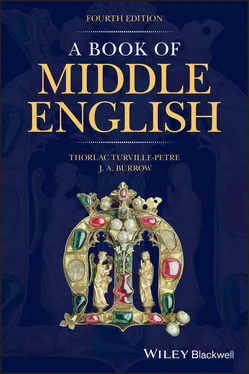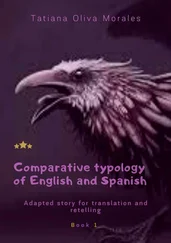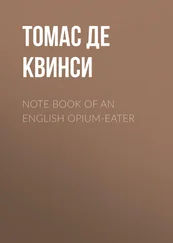The verb has three moods: indicative, subjunctive and imperative. The distinction between indicative and subjunctive is explained later (5.6.6); broadly, it is that the subjunctive is a non‐factual mood, used to express a doubt, hypothesis, conjecture, wish or the like. The imperative is used for orders and requests.
In the indicative mood, verbs may distinguish in form between the first, second and third persons of the singular, but all verbs have just one form throughout the plural (for we , ʒe and hi/þei ). The subjunctive has just one form throughout the singular, to which it adds ‐n throughout the plural.
There are two participles or adjectival forms of the verb: the present participle (in Modern English the ‘ ‐ing participle’), and the past participle (used to form verb‐tenses with ‘have’ and ‘be’, and also as an adjective).
The endings of the present tense are the same for weak and strong verbs, but there are considerable variations according to dialect. Differences may be illustrated by setting out the forms in the language of the Ancrene Wisse (early thirteenth century, South‐West Midlands) side by side with those in the language of the Gawain manuscript (late fourteenth century, North‐West Midlands), taking the verb here ( n ), ‘to hear’, as the example:
| Ancrene Wisse |
Gawain |
| infinitive |
heren |
|
here |
| indicative |
| sg . |
1 |
ich |
here |
I |
here |
|
2 |
þu |
herest |
þou |
heres |
|
3 |
he |
hereð |
he |
heres |
| pl . |
we, ʒe, ha |
hereð |
we, ʒe, þay |
here(n), heres |
| subjunctive |
| sg . |
ich, þu, he |
here |
I, þou, he |
here |
| pl . |
we, ʒe, ha |
heren |
we, ʒe, þay |
here(n) |
| imperative |
| sg . |
|
her |
|
her(e) |
| pl . |
|
hereð |
|
heres |
| present participle |
herinde |
|
herande |
Wherever it occurs, the ‐en ending is gradually lost, leaving ‐e or no ending. The result of this development, in some dialects, is that only the indicative second and third persons singular and the present participle have distinctive endings. In Northern texts the verb ending is generally lost when the plural pronoun immediately precedes the verb: we tyne , 15/300.
The dialectal variations, affecting chiefly the endings of the present indicative third person singular and the plural, and the present participle, are as follows:
Third person singular
1 ‐es is Northern and North Midland (in texts 8–11, and predominantly in 15, with a few ‐eth/‐ith forms; also in the speech of the Northern students in 18a).
2 ‐eth is Southern and South Midland (to the south of Cheshire, Derbyshire and Lincolnshire).
(In Southern dialects the ending ‐eth is reduced to ‐th , which is assimilated into a stem ending in d or t , so that he findeth becomes he fint , ‘he finds’ (5/239); similarly fyght , ‘fights’ (16/103), last , ‘lasts’, sit , ‘sits’, stant , ‘stands’, went (from wenden ), ‘goes’.)
Plural
1 ‐eth is Southern and South‐West Midland (to the south of Shropshire, Warwickshire, Cambridge and Norfolk). It is the form in texts 2–5 and 12.
2 ‐e(n)/‐on is North‐West Midland, East Midland, and from there spread to London (in texts 1, 6, 8–11, 13, 16, 17 and 18).
3 ‐es is Northern (Lancashire, Yorkshire, Lincolnshire and further north), as in text 15 and occasionally 8–11; also in the speech of the Northern students in 18a.
Present participle
1 ‐ing is the general Southern and Midland form (in texts 5–7 and 12).
2 ‐ande is the Northern form, which is also found elsewhere, particularly around London (texts 8–11, 15, and twice in 5).
3 ‐inde is found in the South‐West Midlands (texts 2, 3 and 4).
4 ‐ende is used in the East (texts 1 and 13).
(Note that in many dialects the present participle, which is an adjective, is distinguishable from the verbal noun or gerund which ends in ‐ing in all dialects. Compare the participle in þe stif kyng hisselven / Talkkande , 9/107–8, with Dere dyn upon day, daunsyng on nyʒtes , 9/47, where daunsyng is a noun parallel to dyn .)
In Southern dialects, including the South‐West Midlands, some verbs have infinitives in ‐i ( e ) n or ‐i ( e ); e.g. makien , lokin , luvie . These descend from Old English Class 2 weak verbs, ending ‐ian (see Guide to Old English , §124). These verbs retain the ‐ i ‐ in all parts of the present except the second and third persons singular of the indicative and the imperative singular. Hence in Ancrene Wisse , makien , infinitive (4/13), makeð , third person singular (4/46), makieð , plural (4/3); in Piers Plowman , the infinitives wedy , ‘weed’, 7b/66, and gladyen , ‘gladden’, 7b/126. Some French and Scandinavian loans were conjugated according to this pattern; e.g. servið , ‘(they) serve’, 4/14, proferi (infinitive), ‘offer’, 5/434.
4.5.3 Past Tense and Past Participle
In some dialects the verb in the past tense has distinctions in form for the indicative and subjunctive in the singular, though the subjunctive plural is always the same as the indicative plural. The third person singular of the indicative has the same form as the first person singular.
In the South and South‐West Midlands the past participle has the prefix i ‐ or y ‐, derived from Old English ge‐ , unless there is some other prefix already present: so isiʒen , ‘come’, 3/111, ybuld , ‘built’, 12/1; but bigrowe , ‘overgrown’, 2/27, already has the prefix bi‐ . Langland uses this y ‐ prefix sometimes – compare ycrouned , 7a/59, with crouned , 7a/63 – but Gower rarely has it.
Weak verbs form their past tense by adding ‐ed ( e ), ‐d ( e ) or ‐t ( e ), and their past participle by adding ed , ‐d or ‐t ; thus heren , ‘to hear’, past tense herde , past participle iherd ; luvien , ‘to love’, past tense luvede , past participle iluvet ; slepen , ‘to sleep’, past tense slepte .
The past tense of heren , ‘to hear’, in the language of the Ancrene Wisse :
| indicative |
| sg . |
1 |
ich |
herde |
|
2 |
þu |
herdest |
|
3 |
he |
herde |
| pl . |
we, ʒe, ha |
herden |
| subjunctive |
| sg . |
ich, þu, he |
herde |
| pl . |
we, ʒe, ha |
herden |
| past participle |
|
iherd |
With the loss of ‐en and then of ‐e , the past tense is often unchanged throughout except for the ‐est of the second person singular of the indicative. In the North and the North Midlands the second person singular ends ‐es/‐ez , as in sendez , 8/415, or has ‐e or no ending so that there is one form throughout the past; e.g. second person singular þou me herde , 8/306, past participle (with ‘unhistorical’ ‐e ) I haf herde , 9/26.
Читать дальше












